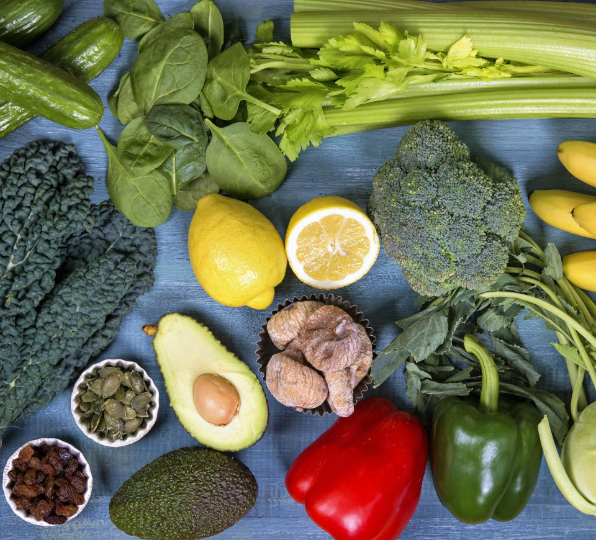Introduction:
Sustaining optimal blood circulation is imperative for general health because it guarantees that the body’s cells receive the necessary nutrients and oxygen. Foods that thin blood, sometimes referred to as natural anticoagulants, are essential for maintaining cardiovascular health because they inhibit blood clot formation and lower the risk of heart attacks and strokes. We’ll discuss the significance of blood-thinning foods in this blog and showcase some of the greatest choices for a more robust circulatory system.
1. Dark Leafy Greens
Dark leafy greens, including spinach, kale, and Swiss chard, are nutritional powerhouses packed with essential vitamins, minerals, and antioxidants. Among their many health benefits, these greens are particularly rich in vitamin K, a fat-soluble vitamin known for its role in blood clotting and cardiovascular health.
Vitamin K plays a crucial role in the blood clotting process, helping to stop bleeding by forming clots at the site of injury. This function is essential for preventing excessive bleeding from wounds and injuries. Additionally, vitamin K contributes to bone health by supporting the formation of proteins involved in bone mineralization.
In addition to its role in blood clotting, vitamin K is believed to play a role in promoting healthy circulation. Adequate intake of vitamin K may help maintain the flexibility and elasticity of blood vessels, which is important for optimal blood flow throughout the body. By supporting healthy circulation, vitamin K may help reduce the risk of cardiovascular diseases such as heart attack and stroke.
Incorporating dark leafy greens into your diet is an excellent way to ensure an adequate intake of vitamin K. Spinach, kale, and Swiss chard can be enjoyed raw in salads, sautéed as a side dish, or blended into smoothies and soups. These greens are versatile ingredients that can be incorporated into a wide range of dishes to boost their nutritional content.
Beyond their vitamin K content, dark leafy greens are also rich in other nutrients that support overall health. They are excellent sources of vitamins A, C, and E, as well as folate, magnesium, and potassium. Additionally, they contain phytonutrients such as lutein and zeaxanthin, which are beneficial for eye health.
2. Fatty Fish
Fatty fish, including salmon, mackerel, and trout, are prized for their rich content of omega-3 fatty acids, a group of polyunsaturated fats known for their numerous health benefits. Among these benefits is their ability to naturally thin the blood, making them valuable additions to a heart-healthy diet.
Omega-3 fatty acids, particularly eicosapentaenoic acid (EPA) and docosahexaenoic acid (DHA), play a crucial role in cardiovascular health. One of their key functions is preventing the formation of blood clots, which can lead to serious conditions such as heart attack and stroke. By inhibiting the aggregation of platelets and reducing the stickiness of blood, omega-3s help maintain healthy blood flow and circulation.
Moreover, omega-3 fatty acids exert anti-inflammatory effects throughout the body. Chronic inflammation is a significant risk factor for cardiovascular disease, as it can damage blood vessels and contribute to the development of atherosclerosis, or the hardening and narrowing of the arteries. By reducing inflammation, omega-3s help protect against these harmful processes and support overall heart health.
Additionally, omega-3 fatty acids have been shown to improve various markers of cardiovascular function. They can lower triglyceride levels, a type of fat in the blood that, when elevated, is associated with an increased risk of heart disease. Omega-3s also help improve blood vessel function by promoting vasodilation, the widening of blood vessels, which enhances blood flow and reduces blood pressure.
Incorporating fatty fish into your diet on a regular basis is an effective way to increase your intake of omega-3 fatty acids and reap their cardiovascular benefits. Aim to include fatty fish in your meals at least twice a week to support heart health. Whether grilled, baked, or pan-seared, these delicious and nutritious fish options can be enjoyed in a variety of flavorful dishes, making them a versatile and heart-smart choice for any diet.
3. Garlic
Garlic, a staple in cuisines worldwide, not only adds flavor to dishes but also offers a range of health benefits, particularly for cardiovascular health. Rich in sulfur-containing compounds like allicin and ajoene, garlic has been revered for centuries for its medicinal properties, including its potential to improve blood circulation and exert anticoagulant effects.
One of the primary ways in which garlic benefits cardiovascular health is by its ability to promote vasodilation, or the widening of blood vessels. Allicin, the compound responsible for garlic’s distinctive odor, has been shown to stimulate the production of nitric oxide in the blood vessels, which helps relax and dilate them. This relaxation of blood vessels leads to improved blood flow and circulation throughout the body, reducing the risk of conditions such as hypertension and atherosclerosis.
Additionally, garlic has demonstrated anticoagulant properties, meaning it can help prevent the formation of blood clots. Ajoene, another sulfur-containing compound found in garlic, has been identified as having antiplatelet activity, which inhibits the aggregation of platelets in the blood. By reducing the tendency of blood to clot excessively, garlic can lower the risk of thrombosis, heart attack, and stroke.
Moreover, garlic has been associated with improvements in lipid profiles, including reductions in LDL cholesterol (the “bad” cholesterol) and triglyceride levels. These lipid-lowering effects contribute to garlic’s overall cardiovascular benefits, as high levels of LDL cholesterol and triglycerides are major risk factors for heart disease.
4. Turmeric
Turmeric, a vibrant golden spice commonly used in culinary and traditional medicine practices, boasts an array of health benefits attributed to its active compound, curcumin. Curcumin is renowned for its potent anti-inflammatory, antioxidant, and antimicrobial properties, making turmeric a valuable addition to any diet aiming to promote overall wellness, including cardiovascular health.
One notable benefit of turmeric is its potential to improve blood circulation and reduce the risk of blood clots. Curcumin has been found to exert blood-thinning effects by inhibiting the activity of platelets and certain clotting factors in the blood. This antiplatelet activity helps prevent the formation of abnormal blood clots that can obstruct blood flow and lead to serious cardiovascular events like heart attack or stroke.
Moreover, curcumin’s anti-inflammatory properties play a crucial role in supporting cardiovascular health. Chronic inflammation is a key contributor to the development and progression of various cardiovascular conditions, including atherosclerosis, hypertension, and endothelial dysfunction. By reducing inflammation in the blood vessels and tissues, curcumin helps maintain vascular integrity and function, thereby promoting healthy blood circulation.
Incorporating turmeric into your diet is simple and versatile. Fresh turmeric root can be grated or sliced and added to soups, stir-fries, curries, or smoothies for a vibrant flavor and a healthful boost. Turmeric powder, derived from dried and ground turmeric root, is equally convenient and can be used as a seasoning in savory dishes or mixed into beverages like golden milk or tea.
It’s important to note that while turmeric offers promising cardiovascular benefits, its bioavailability can be enhanced when consumed alongside black pepper, which contains piperine, a compound that facilitates curcumin absorption. Additionally, consulting with a healthcare professional is advisable, especially for individuals taking blood-thinning medications or with existing medical conditions, to ensure turmeric consumption aligns with their health needs.
5. Berries
Berries, including strawberries, blueberries, and raspberries, are not only delicious but also offer a plethora of health benefits, including their potential to boost metabolism and support weight management. Packed with antioxidants, vitamins, and fiber, these colorful fruits are a nutritional powerhouse that can enhance overall well-being.
One of the key ways in which berries contribute to metabolic health is through their high antioxidant content. Antioxidants help combat oxidative stress and inflammation in the body, which are factors that can impair metabolic function and contribute to weight gain. By neutralizing free radicals and reducing inflammation, antioxidants in berries support optimal metabolic processes, including fat metabolism and energy production.
Additionally, berries are rich in dietary fiber, particularly soluble fiber, which can have a positive impact on metabolism and weight management. Soluble fiber forms a gel-like substance in the digestive tract, which slows down the absorption of nutrients and helps regulate blood sugar levels. This can prevent spikes and crashes in blood sugar, which may otherwise lead to increased hunger and cravings for unhealthy foods. By promoting stable blood sugar levels, fiber-rich berries support a steady metabolism and can aid in weight loss and maintenance.
Incorporating berries into your daily diet is easy and delicious. You can enjoy them fresh or frozen as a convenient snack or add them to a variety of dishes to boost their nutritional content. Blend them into smoothies for a refreshing and metabolism-boosting breakfast or snack, or top your yogurt or oatmeal with a handful of berries for added flavor and fiber. You can also incorporate berries into salads, desserts, and baked goods to enhance both the taste and nutritional value of your meals.
6. Nuts and Seeds
Nuts and seeds are nutritional powerhouses that offer a multitude of health benefits, particularly for cardiovascular health and blood thinning. Rich in omega-3 fatty acids, fiber, and antioxidants, these nutrient-dense foods have earned a well-deserved reputation as heart-friendly additions to any diet.
One of the key components of nuts and seeds that contributes to their cardiovascular benefits is their omega-3 fatty acid content. Omega-3s, particularly alpha-linolenic acid (ALA) found in flaxseeds, chia seeds, and walnuts, possess natural anti-inflammatory properties and have been shown to help thin the blood by inhibiting platelet aggregation and reducing the risk of clot formation. Incorporating omega-3-rich nuts and seeds into your diet can promote healthy blood circulation and lower the risk of cardiovascular diseases such as heart attack and stroke.
Furthermore, nuts and seeds are excellent sources of dietary fiber, which plays a crucial role in maintaining heart health and promoting blood thinning. Fiber helps lower cholesterol levels by binding to cholesterol in the digestive tract and facilitating its excretion from the body, thereby reducing the buildup of plaque in the arteries and improving blood flow. Additionally, fiber promotes satiety, regulates blood sugar levels, and supports a healthy gut microbiome, all of which contribute to overall cardiovascular wellness.
In addition to omega-3 fatty acids and fiber, nuts and seeds are packed with antioxidants such as vitamin E, flavonoids, and polyphenols, which help protect against oxidative stress and inflammation, both of which are implicated in the development of cardiovascular disease. These antioxidants scavenge free radicals in the body, preventing cellular damage and preserving the health of blood vessels and the heart.
7. Citrus Fruits
Citrus fruits, including oranges, lemons, grapefruits, and limes, are not only refreshing and flavorful but also offer a myriad of health benefits, particularly when it comes to cardiovascular health and blood circulation. Packed with essential nutrients like vitamin C, flavonoids, and other phytochemicals, citrus fruits are renowned for their ability to support overall well-being, including the health of your circulatory system.
One of the standout nutrients found abundantly in citrus fruits is vitamin C, a powerful antioxidant that plays a crucial role in maintaining the health of blood vessels. Vitamin C promotes the production of collagen, a protein essential for the structural integrity of blood vessels, helping to strengthen their walls and prevent damage. Additionally, vitamin C supports the synthesis of nitric oxide, a molecule that relaxes blood vessels and improves blood flow, contributing to lower blood pressure and reduced risk of cardiovascular disease.
Flavonoids, another group of beneficial compounds present in citrus fruits, have been extensively studied for their cardiovascular benefits. These plant-based antioxidants help protect blood vessels from oxidative stress and inflammation, reducing the risk of atherosclerosis and improving endothelial function. Flavonoids also exhibit antiplatelet and anticoagulant properties, which may help prevent blood clot formation and promote smoother blood flow throughout the body.
Consuming citrus fruits regularly can be a simple yet effective way to support healthy circulation and cardiovascular function. Whether enjoyed as a refreshing snack, squeezed into juices, or incorporated into various culinary creations, citrus fruits offer versatility and flavor while delivering a potent dose of heart-healthy nutrients. Including a variety of citrus fruits in your diet provides a broad spectrum of beneficial compounds that work synergistically to promote optimal blood flow, lower blood pressure, and reduce the risk of heart disease.
From vibrant oranges and tangy grapefruits to zesty lemons and limes, citrus fruits add brightness and nutritional value to meals and snacks. Whether enjoyed fresh, juiced, or used as a flavor enhancer in dishes and beverages, citrus fruits offer a delicious way to support your circulatory health and overall well-being. Incorporate these wholesome fruits into your daily diet to reap their myriad health benefits and enjoy a heart-healthy lifestyle.
8. Green Tea
Green tea, cherished for its delicate flavor and numerous health benefits, has been consumed for centuries in various cultures around the world. Renowned for its rich content of catechins, potent antioxidants, and other bioactive compounds, green tea is celebrated not only as a soothing beverage but also as a powerful elixir for heart health and overall well-being.
One of the key components of green tea is catechins, a group of polyphenolic compounds with potent antioxidant properties. Among these catechins, epigallocatechin gallate (EGCG) stands out for its remarkable health-promoting effects. EGCG has been extensively studied for its ability to support cardiovascular health by exerting blood-thinning effects, improving blood vessel function, and reducing the risk of blood clots. By inhibiting platelet aggregation and enhancing endothelial function, EGCG contributes to smoother blood flow and reduced risk of thrombosis, thereby promoting heart health and reducing the incidence of cardiovascular events.
Moreover, green tea contains a diverse array of antioxidants, including flavonoids and other polyphenols, which work synergistically to combat oxidative stress and inflammation, two key contributors to cardiovascular disease. These antioxidants scavenge free radicals, neutralize harmful reactive oxygen species, and protect cells from damage, thereby preserving the integrity of blood vessels and promoting overall heart health.
Regular consumption of green tea has been associated with a multitude of cardiovascular benefits, including improved blood vessel function, reduced inflammation, lower blood pressure, and decreased risk of atherosclerosis and cardiovascular events. By incorporating green tea into your daily routine, whether enjoyed hot or cold, you can harness its potent cardioprotective properties and support your heart health naturally.
To maximize the health benefits of green tea, opt for high-quality, organic varieties and brew them properly to extract the optimal concentration of catechins and antioxidants. Enjoy green tea as part of a balanced diet and healthy lifestyle, and reap the rewards of its blood-thinning effects, heart-protective properties, and overall wellness benefits. Whether sipped leisurely as a soothing beverage or enjoyed throughout the day, green tea offers a delicious and effective way to support your cardiovascular health and promote longevity.


Conclusion:
Incorporating blood thinning foods into your diet is an effective way to promote cardiovascular health, prevent blood clots, and support optimal circulation. By incorporating nutrient-rich foods like dark leafy greens, fatty fish, garlic, and turmeric into your meals, you can nourish your body with essential vitamins, minerals, and antioxidants that promote a healthier circulatory system. Make these blood-thinning foods a regular part of your diet to keep your heart and blood vessels strong and resilient for years to come.












